- Home
- Alexandre Dumas
The Women's War Page 3
The Women's War Read online
Page 3
He died, according to his son, Alexandre Dumas fils, wondering if his work would survive, so he would have been gratified by this posthumous homage. He would not have been surprised, either, to learn that The Three Musketeers and The Count of Monte Cristo remain the most popular of his novels, or that they have been successful in adaptations for other media; he and Maquet adapted most of their work for the stage (including The Women’s War), and he would surely have loved the cinema. We, who are familiar with that medium, may often be surprised by how cinematic Dumas’s writing is. He came to the novel as a dramatist and obviously often thinks in terms of scenes, visualizing the action as he describes it, so we can easily imagine The Women’s War on the screen, ideally with all the benefits of wide-screen technology and technicolour, from the opening scenes at the inn, through the great hunt at Chantilly, to the viscountess’s night ride, the battles and the rest… With its dramatic confrontations, its colourful costumes and locations, its clearly delineated characters, intrigues and disguises, this is a novel that was waiting for the cinema to happen. Meanwhile, a ‘forgotten’ part of the Dumas continent is waiting for us to explore and enjoy.
Robin Buss
NOTES
1. See the Note on the Text.
2. 2 July 2003.
3. 3 August 2003.
4. Le Figaro littéraire, 7 August 2003.
5. Reaction to the novel has not always been so complimentary. A. Craig Bell, in his biography (Alexandre Dumas, London: Cassell, 1950), calls it ‘poor stuff’ and attributes it mainly to Maquet, apparently on internal evidence alone, saying that the slow opening is not typical of Dumas. Against that, one could argue that The Count of Monte Cristo also opens quite slowly, introducing all the characters in the early chapters, just as The Women’s War brings its main protagonists together in or around Biscarros’s inn. The style, the humour and the characterization are all typical of Dumas.
6. See, for example, the discussion in Philippe Erlanger’s Louis XIV, trans. Stephen Cox (London: Phoenix, 2003), pp. 7–9.
7. C.-B. Petitot, Collection des mémoires relatifs à l’histoire de France (Paris: Foucault, 1824), vol. XXXV.
8. All of which is lost, of course, when the novel is translated as The Hunchback of Notre-Dame or adapted as a romance about a bellringer and a gypsy girl.
9. Le Figaro, 7 August 2003.
Further Reading
Hemmings, F. W. J., The King of Romance (London: Hamish Hamilton, 1979)
Maurois, André, Three Musketeers. A Study of the Dumas Family, translated by Gerard Hopkins (London: Jonathan Cape, 1957)
Schopp, Claude, Alexandre Dumas. Genius of Life, translated by A. J. Koch (New York: Franklin Watts, 1988)
Stowe, Richard, Alexandre Dumas, père (Boston: Twayne, 1976)
A Note on the Text
In making this translation, I have referred to both the 1848 Calman-Levy text of Dumas’s novel, which includes some chapter headings and the two epilogues, and (for comparison) the first edition in book form, published in Brussels in 1845 (which omits the epilogue and has a slightly different division into chapters). For the sake of consistency, in this translation, I have retained only the titles of the four books and the two epilogues, giving all the chapters numbers and omitting the occasional chapter titles where these were included in earlier editions.
La Guerre des femmes (The Women’s War) was first published in serial form in the newspaper La Patrie in 1844. In the following year, it appeared in book form, in four volumes, in Brussels (Meline: Cans et compagnie). This was followed by an eight-volume French edition (Paris: de Potter, 1845), divided into four sections: ‘Nanon de Lartigues’, ‘Madame de Condé’, ‘Viscountess de Cambes’ and ‘The Abbey of Pessac’, the last volume also containing the epilogues. This was republished by Calman-Levy (Paris, 1848) in two volumes, then in one volume in the same publisher’s ‘Musée littéraire’. Dumas and Maquet did a version for the theatre which was staged in 1849.
The first English translation appeared in 1857 as Nanon; or Women’s War (London: Simms and Macintyre). This was followed by two more translations under the title Nanon: one published by Clarke (London, 1860) and a much abridged version, published by Routledge (London, 1867). It was quite normal for nineteenth-century English translations of Dumas’s novels to cut the text quite considerably, omitting not only material that might offend Victorian ladies, but also passages of description that were felt to hold up the narrative. The last nineteenth-century translation was The War of Women (two vols., London: Dent, 1895; reprinted in 1906 and 1927). This translation, with two illustrations of scenes from the novel, is complete and quite readable, but slightly quaint in its language. Another translation appeared under the title Nanon in 1904 (London: Methuen). After more than a century, the novel needed to be retranslated if it is to come alive for the modern reader.
In this translation, considering that The Women’s War is meant first and foremost as an entertainment, I have tended to ‘over-translate’ rather than ‘under-translate’. In particular, I use English equivalents for titles of nobility, so that the Princesse de Condé becomes ‘Princess de Condé’, the Duc de la Meilleraie, ‘Duke de la Meilleraie’, and so on. I have also used the English word ‘parliament’ for any of the parlements (though, as I explain in the Introduction and in an endnote, they do not at all imply the same kind of institution); and I have translated the name of Biscarros’s inn. I hope that purists will forgive me for the ‘naturalizations’.
I am grateful to my friend, Dr Jean-Pierre Navailles, for his help in clarifying several small points in the text, and to Louisa Sladen, whose meticulous copy-editing saved me from more errors, infelicities and ambiguities than I care to remember. I would also like to thank my editor at Penguin, Laura Barber, who was enthusiastic about this project from the start and so ensured that a lesser-known Dumas novel has joined its more famous fellows among the Penguin Classics.
R.B.
THE WOMEN’S WAR
BOOK I
NANON DE LARTIGUES
I
A short distance from Libourne, that joyous town reflected in the swift waters of the Dordogne, between Fronsac and Saint-Michel-la-Rivière, there was in former times a pretty village of white walls and red roofs, half buried in fronds of sycamore, lime and beech. The road from Libourne to Saint-André-de-Cubzac ran through the midst of its symmetrical rows of houses and offered the only view that they had. Behind one of these rows of houses, and roughly a hundred paces from it, wound the river, its width and powerful current starting at this point to announce the nearness of the sea.
Then the civil war came here. First of all, it uprooted the trees, then it depopulated the houses, which, being exposed to all its furious whims and not able, like their inhabitants, to run away, gradually collapsed into the lawns, protesting in their own way against the barbarism of internecine strife, and bit by bit the earth, which seems to have been created as a tomb for all that ever was, spread over the corpses of these once so merry and pleasant dwellings. Finally, grass grew over this artificial ground, and today the traveller who follows the solitary road would never imagine, as he looks at one of those great flocks that you find everywhere in the south of France grazing on these uneven hillocks, that the shepherd and his sheep tread on the graveyard where a village lies.
But at the time of which we speak, namely around the month of May in the year 1650, this same village extended on both sides of the road, which nourished it like a great artery with the most delightful wealth of life and vegetation. The stranger who passed through it in those days would have been gladdened by the sight of the peasants harnessing or unharnessing the teams from their ploughs, the boatmen drawing their nets to the bank shimmering with the white and pink fish of the Dordogne and the blacksmiths smiting hard on their anvils, their hammers throwing off in all directions a spray of sparks that lit up the forge with every blow.
However, what would have charmed him most, especially if his journey had given him the
proverbial appetite attributed to travellers on the highway, would have been a long, low house some five hundred yards beyond the village, consisting only of a ground floor and first floor, from the chimneys of which emerged certain exhalations and from the windows certain agreeable odours that indicated more clearly even than the gilded calf’s head painted on a sheet of red metal, creaking where it hung from an iron rod fastened into the entablature on the first floor, that he had reached at last one of those hospitable establishments whose owners, at a price, undertake to refresh the hungry visitor.
Why, you ask, was this hostelry of the Golden Calf situated five hundred yards outside the village, instead of occupying its natural place amid the charming houses ranged on either side of the main road?
The first reason is that the innkeeper, despite being buried in this obscure hamlet, was a master of his art when it came to cooking. And, had he chosen at the start a spot in the middle or at the far end of one of the two long rows of houses that made up the village, he risked being mistaken for one of those cheap eating houses that he was obliged to accept as his fellows in the restaurant trade, but which he could not bring himself to consider as his equals; while, on the contrary, by setting himself apart, he attracted the attention of connoisseurs, who, when they had tasted his cooking just once, would tell each other: ‘When you go from Libourne to Saint-André-de-Cubzac – or from Saint-André-de-Cubzac to Libourne – do not fail to stop and lunch, dine or sup at the inn of the Golden Calf, five hundred yards beyond the little village of Matifou.’
So these connoisseurs would stop, leave well pleased and send along other connoisseurs, with the result that the clever innkeeper gradually made a fortune for himself, though this, remarkably, did not prevent him from maintaining the same high gastronomic standards at his table – which only goes to prove, as we said earlier, that Master Biscarros was a true artist.
On one of those lovely May evenings when Nature, already reawakened in the south, starts to wake in the north, thicker tufts of smoke and more delicious scents than usual were wafting from the chimneys and through the windows of the inn of the Golden Calf, while on the threshold of his premises, Biscarros himself, dressed in white according to the universal and timeless custom of sacrificial priests, was plucking with his own noble hands some partridge and quail intended for one of those fine dinners that he knew so well how to compose, and which he was in the habit of supervising down to the last detail, purely out of love for his art.
Daylight was fading, and the waters of the Dordogne were starting to whiten beneath the blackness of the foliage on its banks. The river at this point, in one of those meanders that bestrew its course, turned away from the road to lie about one quarter of a league away1 and passed beneath the little fort of Vayres. Something calm and melancholy spread across the countryside with the evening breeze. The ploughmen were returning with their horses unharnessed, and the fishermen with their streaming nets. The sounds of the village were hushed, and when the last hammer blow had sounded, marking the end of the day’s labour, the first song of the nightingale was heard from some bushes nearby.
With the first notes that emerged from the throat of the feathered musician, Master Biscarros also began to sing, no doubt to accompany it. Thanks to this harmonic competition and the attention he was paying to his work, the innkeeper did not observe a little troop of horsemen appearing at the far end of the village of Matifou and proceeding towards his inn. But an exclamation from a first-floor window and the brusque, noisy closing of the same made the worthy innkeeper look up, and it was then that he saw the rider at the head of the troop coming directly towards him.
‘Directly’ is not quite the word, and we hasten to correct ourselves: the man stopped every twenty paces, cast an enquiring glance to right and left, scanning the paths, trees and bushes with his eyes and holding a carbine on his knee to be ready for either attack or defence, while now and then signalling to his companions, who were copying his every movement, to start walking. At which he would once more risk advancing a few steps, and the whole manoeuvre began again.
Biscarros was watching this rider, whose unusual behaviour so utterly absorbed him that all this time he forgot to remove the bunch of feathers that he was holding between thumb and index finger from the body of the bird.
‘It’s a nobleman looking for my house,’ said Biscarros. ‘This worthy gentleman is doubtless short-sighted – and yet my Golden Calf has been freshly repainted and the sign projects out a long way. Come now, let’s show ourselves.’
He went and stood in the middle of the road, where he continued to pluck his partridge with expansive, majestic gestures.
This movement produced the result that he had been waiting for: no sooner did the horseman notice him than he rode directly towards him, greeting him courteously.
‘Excuse me, Master Biscarros,’ he said. ‘I don’t suppose you have seen a troop of men-at-arms hereabouts, who are friends of mine and must be looking for me? Men-at-arms? I may exaggerate. Swordsmen is more like it, in brief, armed men, what? Yes, that’s it! You haven’t seen a troop of armed men?’
Biscarros, greatly flattered at being greeted with his own name, returned the greeting affably. He had not noticed that a single glance at his inn had allowed the stranger to read Biscarros’s name and title, just as he had identified the owner from his bearing.
‘As for armed men, sir,’ Biscarros answered, after thinking for a moment, ‘I have seen only a gentleman and his attendant, who arrived here an hour or so ago.’
‘Ah, ha!’ said the stranger, stroking his chin – manly, though almost entirely beardless. ‘Ah, ha! There is a gentleman and his attendant in your hostelry. And both of them are armed, you say?’
‘Yes, sir. Do you wish me to tell the gentleman that you would like to speak to him?’
‘Now, is that entirely proper?’ said the stranger. ‘To bother a person one does not know in this way may be to exhibit an excess of familiarity, especially if the other is a person of quality. No, no, Biscarros, just describe him to me, pray, or better still, point him out without him seeing me.’
‘It would be hard to point him out, sir, since he appears to be hiding himself, because he shut his window as soon as you and your companions appeared on the road. It’s easier to describe him to you: he’s a little gentleman, young, fair-haired and delicate, barely sixteen years old, who seems to have just enough strength to carry the little dress sword hanging from his belt.’
The stranger furrowed his brow at the shadow of a memory.
‘Very well,’ he said. ‘I can see what you mean: a blond, effeminate young master on a Barbary horse, followed by an old servant as stiff as a pole. That’s not the one I’m looking for.’
‘Ah, so that’s not the person the gentleman is after,’ said Biscarros.
‘No.’
‘Well, while the gentleman is waiting for the person he is after, who is bound to pass this way, he might as well come into my inn and refresh himself, along with his companions.’
‘No, thank you. All that’s left is for me to thank you and ask you the time.’
‘There’s six o’clock sounding on the village clock, Monsieur. Can you hear its great voice?’
‘Indeed. And one more favour, Monsieur Biscarros?’
‘Certainly.’
‘Pray, can you tell me how I might procure a boat and a boatman?’
‘To cross the stream?’
‘No, to go for a trip down the river.’
‘Nothing could be simpler. The fisherman who supplies my fish… But do you like fish, Monsieur?’ Biscarros asked, in a kind of parenthesis, returning to his idea of getting the stranger to take something at the inn.
‘It’s a dull food,’ the traveller replied. ‘However, when it is passably well seasoned, I don’t refuse it.’
‘I always have excellent fish, Monsieur.’
‘I congratulate you on it, Master Biscarros, but let’s return to the person who supplies it for you.’
‘Of course. Well, at this time he has probably finished his day’s work and will be taking his dinner. You can see his boat from here, tied up to those willows near the elm tree over there. As for his house, it is hidden by that other clump of willows. You’ll surely find him at his table.’
‘Thank you, Master Biscarros, thank you,’ said the stranger, and, signalling to his companions to follow him, he quickly headed for the trees and knocked on the door of the hut in question. It was opened by the fisherman’s wife, and, as Biscarros had said, the fisherman himself was at his table.
‘Take your oars and follow me,’ said the horseman. ‘You can earn a crown.’2
The fisherman leapt up with a haste that indicated how poorly the innkeeper at the Golden Calf reimbursed him for his wares.
‘Does the gentleman want to go down to Vayres?’ he asked.
‘I just want you to row me to the middle of the river and stay there with me for a few minutes.’
The fisherman’s eyes bulged at the idea of this odd whim, but since there was a crown to be earned, and because he could see the outline of the other riders twenty yards behind the one who had knocked on his door, he did not argue, considering that any lack of goodwill on his part might lead to the use of force and that in the struggle he would lose his promised reward. So he hastened to let the stranger know that he himself, his boat and his oars, were at his service.
The little band of men headed directly towards the river and, while the stranger was proceeding to the waterside, it halted at the top of the embankment, spreading out so that it had covered all directions, no doubt from fear of being surprised. From where the men were placed, they could keep a watch on the flat ground behind them and protect the boat and those embarking in it at the foot of the embankment.

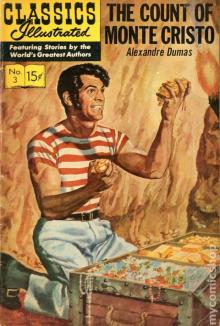 The Count of Monte Cristo, Illustrated
The Count of Monte Cristo, Illustrated Knight of Maison-Rouge
Knight of Maison-Rouge![The Three Musketeers - Alexandre Dumas - [Full Version] - (ANNOTATED) Read online](http://i1.bookreadfree.com/14/the_three_musketeers_-_alexandre_dumas_-_[full_version]_-_annotated_preview.jpg) The Three Musketeers - Alexandre Dumas - [Full Version] - (ANNOTATED)
The Three Musketeers - Alexandre Dumas - [Full Version] - (ANNOTATED)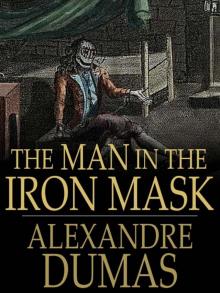 The Man in the Iron Mask
The Man in the Iron Mask The Count of Monte Cristo (Penguin Classics eBook)
The Count of Monte Cristo (Penguin Classics eBook) Count of Monte Cristo (abridged) (Barnes & Noble Classics Series)
Count of Monte Cristo (abridged) (Barnes & Noble Classics Series) The Women's War
The Women's War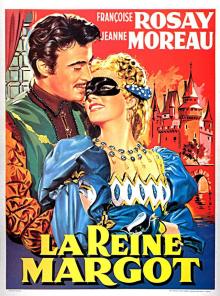 La reine Margot. English
La reine Margot. English The Vicomte de Bragelonne
The Vicomte de Bragelonne__english_preview.jpg) La dame aux camélias (Novel). English
La dame aux camélias (Novel). English The Count of Monte Cristo
The Count of Monte Cristo Balsamo, the Magician; or, The Memoirs of a Physician
Balsamo, the Magician; or, The Memoirs of a Physician Ten Years Later
Ten Years Later The Romance of Violette
The Romance of Violette The Mesmerist's Victim
The Mesmerist's Victim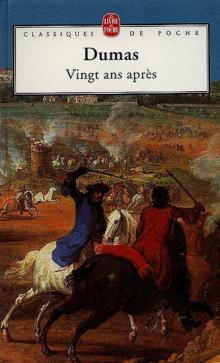 Vingt ans après. English
Vingt ans après. English Le collier de la reine. English
Le collier de la reine. English Taking the Bastile; Or, Pitou the Peasant
Taking the Bastile; Or, Pitou the Peasant The Hero of the People: A Historical Romance of Love, Liberty and Loyalty
The Hero of the People: A Historical Romance of Love, Liberty and Loyalty Louise de la Valliere
Louise de la Valliere Les Quarante-cinq. English
Les Quarante-cinq. English Ange Pitou (Volume 1)
Ange Pitou (Volume 1) The Royal Life Guard; or, the flight of the royal family.
The Royal Life Guard; or, the flight of the royal family. Les trois mousquetaires. English
Les trois mousquetaires. English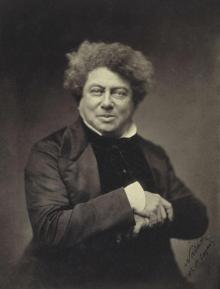 Une fille du régent. English
Une fille du régent. English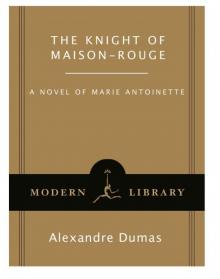 The Knight of Maison-Rouge
The Knight of Maison-Rouge The Count of Monte Cristo (Unabridged Penguin)
The Count of Monte Cristo (Unabridged Penguin) Ange Pitou
Ange Pitou The Romance of Violette (vintage erotica)
The Romance of Violette (vintage erotica) The Three Musketeers
The Three Musketeers Three Musketeers (Barnes & Noble Classics Series)
Three Musketeers (Barnes & Noble Classics Series) Georges
Georges Man in the Iron Mask (Barnes & Noble Classics Series)
Man in the Iron Mask (Barnes & Noble Classics Series) The Red Sphinx
The Red Sphinx